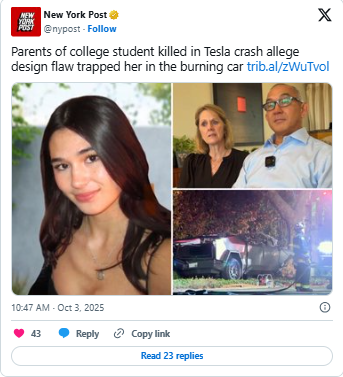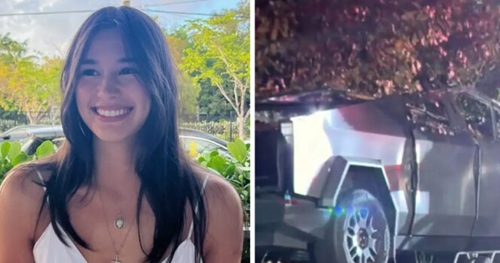A California college student, Krysta Tsukahara, 19, was tragically burned alive after being trapped inside a Tesla Cybertruck that caught fire following a crash that also killed two of her friends. On November 27, 2024, Krysta was traveling with three friends in a Tesla Cybertruck when the vehicle collided with a retaining wall and ignited. The accident occurred during their Thanksgiving break after they had returned home from Piedmont High School, where all three victims were recent graduates.
Police officers arriving at the scene found the Tesla fully engulfed in flames. The crash resulted in multiple deaths. Krysta, driver Soren Dixon, 19, and passenger Jack Nelson, 20, were trapped inside as the fire spread and could not escape. The only survivor was Jordan Miller, who was rescued by a friend who broke the vehicle’s window using a tree branch after repeatedly striking it. Miller was found barely conscious and pulled from the burning vehicle just before it was completely consumed by flames. Toxicology reports showed that Dixon, the driver, had methamphetamine, cocaine, and a blood alcohol level more than twice the legal limit. Krysta and Nelson also tested positive for alcohol and cocaine.
According to a wrongful death lawsuit filed by Krysta’s parents, she survived the initial crash with minor injuries but was unable to open the Tesla’s doors due to an electrical failure in the vehicle’s system. Attempts by a Good Samaritan to help her escape through the front passenger window also failed because the doors remained locked. Krysta ultimately died from smoke inhalation and severe burns.
The families of Krysta and Jack Nelson have filed lawsuits against Tesla and the estate of the Cybertruck’s owner, Charles Patterson. They allege that Tesla has known about defects in the electronic door system that can fail in emergencies but has not addressed these safety issues. The lawsuits argue that the manual door release is poorly designed, hard to find, and impractical to use in a crash fire, effectively trapping passengers inside.

Krysta’s family attorney described the situation as a “horror story,” stating that Tesla is aware of the risks but continues to sell vehicles with dangerous door systems that prevent escape. He said her death was preventable and blamed Tesla’s design failures. Krysta’s father expressed grief and frustration, saying his daughter was a bright, kind young woman whose life was cut short unnecessarily. He criticized Tesla for releasing a vehicle with such serious safety flaws.
The Nelson family’s lawsuit also highlighted that rear passengers had only a hidden mechanical release that was difficult to locate or use in an emergency, leaving them vulnerable. Although authorities determined that impaired driving and speeding contributed to the crash, the families insist that Tesla should still be held accountable for allowing the vehicle to trap its passengers. Tesla’s Cybertruck, launched in late 2023, has faced multiple recalls and legal challenges within less than two years of release. The incident has increased scrutiny on Tesla’s vehicle design and safety measures. Investigations and legal proceedings continue as the community awaits answers about how such a tragedy could happen and whether Tesla will make necessary changes to protect future drivers.







